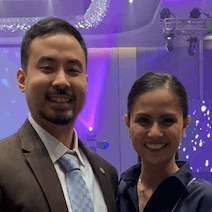SUMMARY
This is AI generated summarization, which may have errors. For context, always refer to the full article.
![[OPINION] The mark of a good leader](https://www.rappler.com/tachyon/r3-assets/612F469A6EA84F6BAE882D2B94A4B421/img/474F2A7FEBD14B388CB02B36E0EBAFE8/mark-good-leader-imho.jpg)

One of the most shared tweets about Filipinos and the coronavirus is how Filipinos negatively react to everything. Where Italians unite to sing jovial hymns from their balconies and the Spanish come together to applaud essential workers from their windows, Filipinos are cursed in seeing things wrongly. Everyone is critical of everyone.
Thus, for the past weeks, we have been consciously looking at the bright side, not just in our lives, but and especially in the leaders who have been running their communities well. Our little research has led us to this conclusion: it is not age, gender, or race that makes a leader good. The mark of a good leader is the right balance of empathy and control. (READ: [ANALYSIS] A failure of execution)
Empathy is a governance competency like no other skill that allows leaders to understand the needs of others. Empathy involves vicarious introspection or the ability to place oneself in the position of another. The skill looks directly to the other person and gauges the other’s feelings. In other words, empathy requires deep intuition, is selfless and totally removes the focus from oneself and shifts it to another.
Justice Ruth Bader Ginsburg of the United States Supreme Court clearly understands what it means to be an empathetic leader. As a young lawyer, Ginsburg staunchly defended gender equality. During her early stint as a member of the American Civil Liberties Union, Ginsburg focused on defending women’s rights. Ginsburg defended women similarly situated to her because of her own experiences of gender discrimination in law school and in law practice.
However, the true measure of Ginsburg’s empathetic leadership was when she defended other sexes who suffered gender discrimination too. Particularly in 1975, Ginsburg successfully defended a male client who suffered discrimination from a law that granted social security benefits solely to widows and not to male widowers. No longer drawing from her own inward experiences, Ginsburg looked outward and assessed the other person’s plight based on the other’s own experience and feelings.
We acknowledge, however, that empathy by itself is not enough. A good leader couples empathy with the right amount of control. Control, in this sense, does not pertain to dominance or complete authority. To be in control is to acknowledge all the facts, whether positive or negative, and project a certain hope that the community’s problems can be managed together.
A concrete example of a leader in control is New Zealand Prime Minister Jacinda Ardern, as seen, first, with how she dealt with the Christchurch shootings and recently, with how she is managing the coronavirus pandemic. In both instances, she sensibly acknowledged all the facts but emphasized that her government is strong only when her people cooperate. She managed and is managing both crises by persuading everyone to work together for the country – from listening to health experts and scientists, to urging everyone through Facebook Live to stay at home for their elderly neighbor. Through her leadership, New Zealand’s citizens have persistently volunteered to give information to aid the government’s aggressive implementation of contact-tracing policies. This collective effort from the country brought about by Prime Minister Ardern’s control has greatly reduced the coronavirus incidence in their country. As of late, New Zealand’s top health official claims the successful elimination of the coronavirus in their country and that registered daily infections have been reduced to single digits.
In these unprecedented times, there also are Filipino leaders manifesting the marks of a good leader: there is Cabinet Secretary Karlo Nograles who calmly gave the whole nation a comprehensive yet clear daily report during his month-long stint as the IATF spokesperson; there is Vico Sotto who has brought youthful, creative, and innovative leadership in Pasig by introducing proactive measures of controlling the pandemic; there is Sadanga Municipal Mayor Gabino Ganggangan who did not accept the national government’s relief goods because the better-off in their municipality are expected to take care of the ones in need; there is the owner of Manilabake who distributed unused sacks of flour in her bakery to home bakers and cooks to make thousands of piaya for the hungry; there are the simple Filipino citizens who, not even leaders, voluntarily returned the cash subsidies they received to support other impoverished families in direr need of financial assistance.
Sadly, having good leaders will still not ensure everyone’s safety from the dreaded virus. Leaders with the perfect balance of empathy and control, however, will provide us with much needed direction, hope, and consistency during these tumultuous times.
As for us who are being led, the best thing to do now is to spread these stories of good leadership and pray that they may finally resonate with those who need to hear them most. – Rappler.com
Add a comment
How does this make you feel?
There are no comments yet. Add your comment to start the conversation.